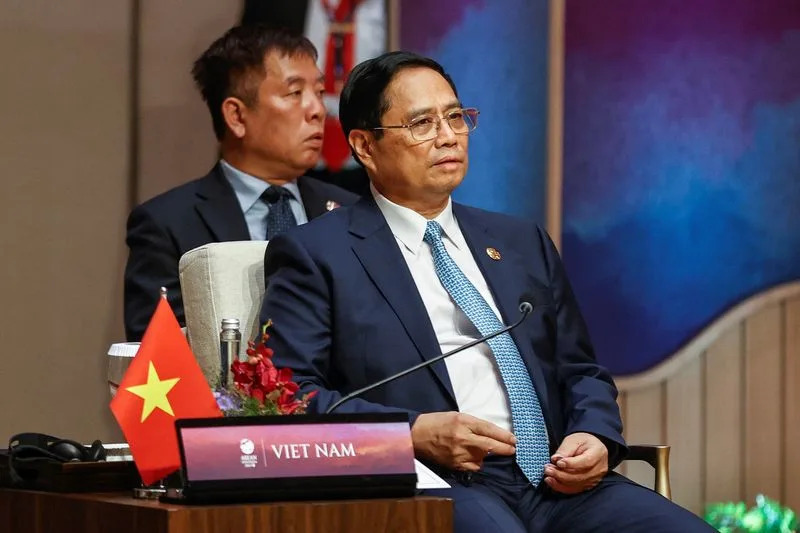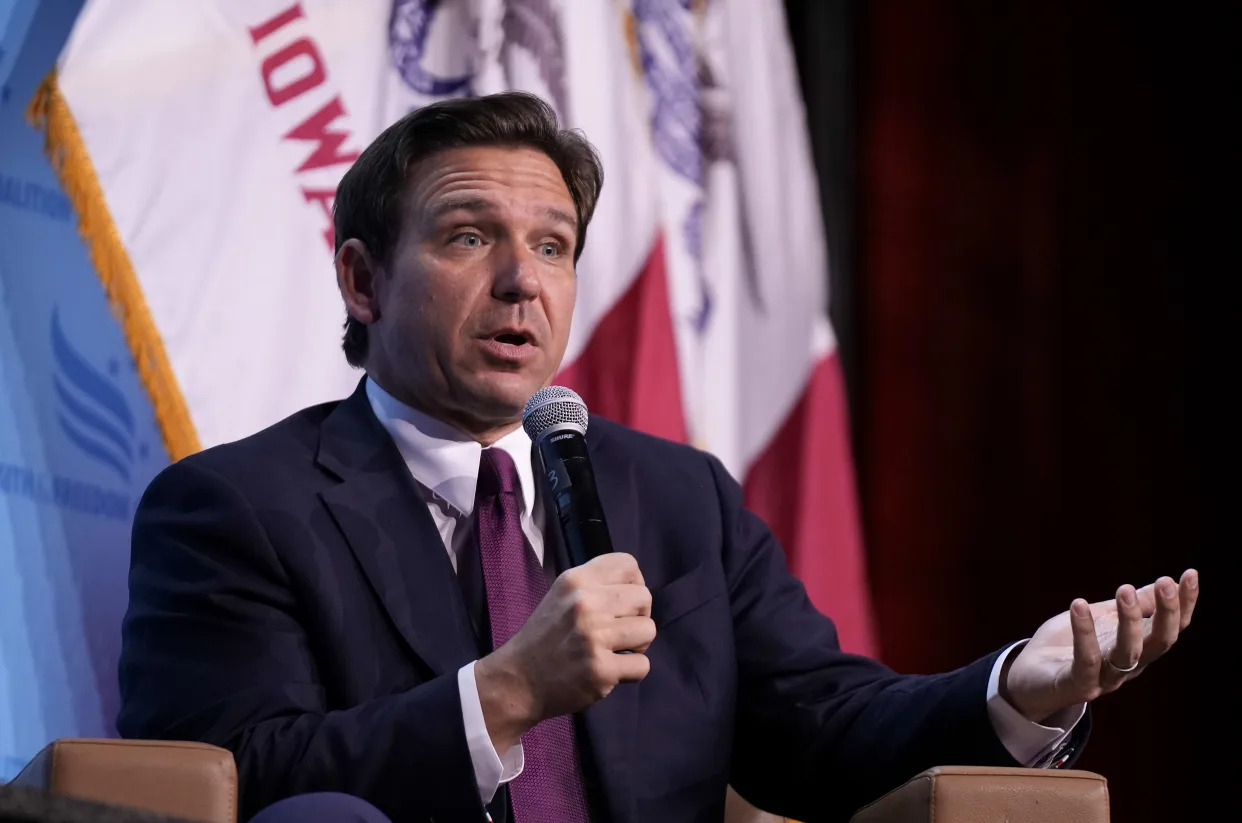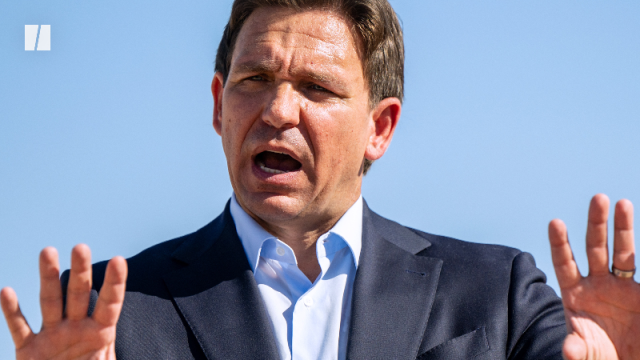Wed, September 20, 2023
HANOI (Reuters) - Vietnam detained an energy expert a few days after U.S. President Joe Biden visited and announced multiple joint initiatives including on protecting human rights, the 88 Project charity said on Wednesday.
Hanoi police took Ngo Thi To Nhien, Executive Director of the Vietnam Initiative for Energy Transition (VIET), an independent think tank focused on green energy policy, into custody on Sept. 15, the charity said in a statement.
The authorities have made no announcement about the detention and no local media has reported it. The government did not immediately respond to a Reuters request for comment.
A person familiar with the matter confirmed to Reuters that Nhien had been detained.
Another five energy and climate experts are currently detained in Vietnam, Project 88 said, as the Communist-ruled country has been negotiating with international partners to speed up policies to tackle climate change.
At the time of her detention, Nhien was cooperating with the United Nations Development Programme (UNDP)'s Vietnam office on implementing the Just Energy Transition Partnership, a $15.5 billion pledge by G7 and other countries to help Vietnam reduce its use of coal, the charity and the source said.
UNDP Vietnam was not immediately available for a comment.
Biden left Vietnam on Sept. 11 after having upgraded diplomatic relations and sealed multiple deals with Hanoi's leaders, drawing criticism from human rights organisations who accused him of sidelining issues of human rights.
The White House fact sheet about the visit weighed in at over 2,600 words, including 112 words on human rights. It mentioned "enhanced commitment to meaningful dialogue" on promoting and protecting human rights, without elaborating.
Reuters reported on Tuesday that as part of the agreement, two detained rights activists were released and another two who had been barred from leaving Vietnam would be allowed to relocate to the United States.
Before Biden's visit, Vietnam was holding at least 159 political prisoners and detaining 22 others, Human Rights Watch said earlier this month.
"Nhien's detention demonstrates that the Vietnamese government is using political prisoners as bargaining chips in diplomatic negotiations," said Project 88 co-director Ben Swanton.
The U.S. embassy in Hanoi did not immediately respond to a request for comment.
(Reporting by Francesco Guarascio)
What to Know About Vietnam’s Persistent Crackdown on Environmentalists
Koh Ewe
Thu, September 21, 2023

A demonstration during global climate strike week, in Hanoi on Sept. 27, 2019.
The head of an energy research think tank was detained by Vietnamese authorities last week, the latest in a string of arrests of prominent environmentalists that highlights the government’s growing irascibility to environmental activism in Vietnam.
According to human rights advocacy group The 88 Project, Ngo Thi To Nhien, the executive director of independent Hanoi-based think tank Vietnam Initiative for Energy Transition, was arrested on Sep. 15 for “unknown reasons.”
Nhien, whose think tank aims to accelerate the shift away from fossil fuels toward renewables in Vietnam, had previously worked with international organizations like the World Bank and the United Nations. She is believed to be the sixth environmental figure detained in two years, amid a nationwide crackdown on some of the most recognizable faces of the country’s environmental advocacy scene, including those leading registered non-profits.
Read More: Asia Is Home to 99 of the World’s 100 Cities Facing the Greatest Environmental Challenges
“Over the past two years, Vietnam’s one-party state has imprisoned the entire leadership of [the] country’s climate change movement on false charges of tax evasion,” Ben Swanton, co-director of The 88 Project, tells TIME, adding that the spate of arrests reveals a Vietnamese government that thinks it “can do whatever [it] wants.”
Next week, Hoang Thi Ming Hong, former director of the Center of Hands-on Actions and Networking for Growth and Environment, is set to be tried for tax evasion—a charge that critics say is commonly used as a political tool to penalize dissenters. Hong’s detention in May sparked concern from the international community about shrinking civil liberties in the country. Her NGO, founded in 2013 and shut down last year, focused on encouraging young Vietnamese to tackle environmental issues ranging from pollution to illegal wildlife trade.
“What’s become shockingly clear is the government has decided anyone leading efforts to combat climate change and promote environmental action is somehow politically opposed to the ruling Vietnamese Communist Party and government,” says Phil Robertson, the deputy Asia director of Human Rights Watch.
“This absurd conclusion is a telling indication of both the authoritarianism and the paranoia of the country’s leaders.”
Why environmental issues?
Environmental issues have in recent decades become politicized in Vietnam, where grievances over the environment have often extended into criticisms of the government. Between the late 2000s and early 2010s, an ambitious bauxite mining project launched by the government sparked heated opposition from local residents who were concerned about its environmental impact and Chinese involvement in the project; in 2016, a chemical spill along Vietnam’s central coastline, now known as one of Vietnam’s worst environmental disasters, followed by an evasive government response to the fallout, triggered rare large-scale protests that was ultimately quashed with arrests by authorities.
“While the enormous strain being placed on Vietnam’s ecosystem is a matter of urgent public concern, the activism that brings attention to environmental issues sometimes also highlights ineffective environmental governance and illegal business practices,” says Jonathan D. London, a professor and Vietnam scholar at Leiden University in the Netherlands. “This, in turn, is often viewed by authorities as a broad critique of and open challenge to one-party rule.”
In addition to activists, environmental lawyers, academics, and journalists have all found themselves targeted for their work. “Authorities have become increasingly intolerant in recent years, and researchers are very cautious,” says Ole Bruun, a social science professor at Roskilde University in Denmark who has researched environmental activism in Vietnam.“When someone transcends the fine line between activism and NGO work and at the same time criticize[s] government, the authorities will crack down.”
Read More: Press Freedom Is Under Attack Across Southeast Asia. Meet the Journalists Fighting Back
Diplomatic repercussions
As environmental advocacy at home continues to be met with crackdown, experts say that the Vietnamese government’s heavyhanded approach to silencing critics is set to remain a sore spot in the country’s growing diplomatic engagements.
In June, the German government voiced concerns about the detention of Hong, the environmental expert, criticizing her arrest as contradicting the agreement to involve civil society in the Just Energy Transition Partnership between Vietnam, the G7 member states (including Germany), Denmark, and Norway—a deal struck last December that would see Vietnam receiving $15.5 billion in financial support to wean off coal and reach net zero carbon emissions by 2050.
Faced with international pressure and an ambitious energy transition goal, the Vietnamese government has relented to an extent. Nguy Thi Khanh, a renowned climate activist and founder of the non-profit Green Innovation and Development Centre, whose arrest last year was met with outcry both at home and abroad, was quietly released in May—five months ahead of her scheduled release date. No official reason was given for her early release, but observers speculated at the time that it was to reassure other environmental advocates in the country whose expertise were needed for Vietnam’s energy transition plan.
Former journalist Mai Phan Loi, who founded the environmental non-profit Center for Media in Educating Community, was also released from prison this month after being sentenced to four years for tax evasion in January 2022. His early release came shortly before President Joe Biden visited Hanoi as the U.S. and Vietnam upgraded bilateral ties. Loi’s release was reportedly a result of behind-the-scenes campaigning by officials from the U.S. embassy in Vietnam. A bipartisan letter, written by several members of Congress to Biden before his Hanoi trip, also urged the President to challenge human rights violations in Vietnam.
But in the joint statement made by Biden and his Vietnamese counterpart Nguyen Phu Trong, human rights were “barely mentioned,” noted Swanton from The 88 Project. And Bach Huong Duong, Loi’s colleague and the director of the Center for Media in Educating Community, who was sentenced to 27 months in prison for tax evasion, remains behind bars.
Despite widespread condemnation, Vietnam’s concerning human-rights record is unlikely to significantly hinder the country’s warming ties with the West, says Bruun, the academic—especially with Vietnam being seen as an increasingly attractive diplomatic partner amid rising concerns about China.
Read More: U.S. General’s Prediction of War With China ‘in 2025’ Risks Turning Worst Fears Into Reality
“The Western world has chosen to turn a blind eye to many unpleasant developments in the country, including the incredibly poor environmental performance,” he says. “I fear that great power conflict will make it easier for Vietnam to get away with rising repression and human rights violations.”
Exclusive-Vietnam activists to seek US refuge after Biden administration deal -US officials
Mon, September 18, 2023

U.S. President Biden visits Vietnam
By Trevor Hunnicutt
WASHINGTON (Reuters) - Two Vietnamese activists who the Biden administration believes were wrongly detained by the country's Communist government are relocating to the United States under an agreement negotiated ahead of the president's recent visit to Hanoi, U.S. officials told Reuters. A human rights lawyer who campaigned for accountability for police abuses, a Catholic parishioner evicted from his home, and their families are exiting Vietnam for the United States, one of the officials said.
In the United States, the families are expected to seek resettlement under the "Priority 1" refugee program. The activists were not imprisoned, but had been barred from leaving Vietnam.
Vietnam's government had also agreed to release two imprisoned Vietnamese activists sought by the United States prior to Biden's visit last week, a U.S. official said, and signed a private agreement to make progress on religious freedom, non-governmental organization (NGO) operations in the country, prison conditions and labor laws, one of the officials said.
The topics of the private agreement, which Reuters has not independently reviewed, were not previously reported. They were inked as Vietnam agreed to lift Washington to Hanoi's highest diplomatic status alongside China and Russia on a trip in which Biden endorsed the country's vision as a high-tech leader.
The agreements come as the Biden administration faces criticism over its diplomacy with Vietnam, India and Saudi Arabia, whose governments deny political freedoms enjoyed in the West, and over its negotiations around a prisoner exchange with Iran.
The Vietnamese prisoners included a legal scholar focused on religion who was released to Germany and another individual sentenced for tax evasion related to his NGO.
The officials would not identify any of the four people, citing diplomatic and security sensitivities, but the two ex-prisoners' names are known. Legal advocate Nguyen Bac Truyen confirmed his release and his travel with his wife to Germany earlier this month. The release of independent journalist Mai Phan Loi was also confirmed earlier this month.
'REPRESENTATIVES OF A MUCH LARGER GROUP'
The Vietnamese human rights community sees the situation there as dire.
Vietnam is holding at least 159 political prisoners and detaining 22 others, Human Rights Watch said earlier this month. They have sentenced 15 people to long prison terms without a fair trial this year, the advocacy group said.
Vietnam is also drafting new rules that would curtail freedom of expression online, banning social media users who publish news-related content without being registered as journalists, according to people familiar with the plans.
"It's outrageous that President Biden chose to upgrade diplomatic ties with Vietnam at a time when the one-party state is in the middle of a brutal crackdown on activism, dissent and civil society," said Ben Swanton, co-director of Project 88, a rights advocacy focused on Vietnam.
Vietnam often releases such prisoners before presidential visits. Biden administration officials pushed for the exit visas as an additional step during final negotiations over the joint statement and trip logistics, according to one of the U.S. officials.
The people are "representative of a much larger group that we believe should be free," the U.S. official said.
"While we wish that we could have gotten many more people out ahead of the president's visit, we do believe that this increased partnership and the strengthened relationship gives us the vehicles and the processes we need to keep working on these issues with Vietnamese friends."
U.S. officials said they hope those conversations will happen both in annual rights dialogues with the Vietnamese - which have sometimes been dismissed by some rights activists and officials as an insubstantial exchange of talking points - as well as in ongoing talks between U.S. Secretary of State Antony Blinken and his Vietnamese counterpart, Bui Thanh Son.
(Reporting by Trevor Hunnicutt in Washington; Additional reporting by Francesco Guarascio in Hanoi. Editing by Heather Timmons and Bill Berkrot)
Vietnam Sees Closer US Economic Ties Post-Diplomatic Upgrade
Mai Ngoc Chau and Nguyen Xuan Quynh
Tue, September 19, 2023

(Bloomberg) -- Vietnam’s Prime Minister Pham Minh Chinh is pressing for closer economic and technological ties with the US during his trip to America a week after the two countries upgraded diplomatic ties.
US Commerce Secretary Gina Raimondo told the premier in a Washington meeting she will push for designating Vietnam market economy status, according to a post on Vietnam’s government website. The US said it would “expeditiously consider” the request during President Joe Biden’s visit to Hanoi last week. The US currently classifies Vietnam as a “non-market economy,” which can be disadvantageous to Vietnamese exporters during anti-dumping petitions.
Chinh, in a meeting with US Trade Representative Katherine Tai, asked the US to further open its market for Vietnamese goods, such as textiles, footwear and agricultural products, and not apply trade defense measures on products from the country, according to the statement.
The prime minister’s US visit comes as his government works to boost a struggling export-dependent economy amid a global slowdown in demand for Vietnamese goods. Vietnam’s exports dropped for a sixth straight month in August, the longest slump in 14 years.
Chinh observed announcements of agreements involving Synopsys Inc. and Cadence Design Systems Inc. to help develop Vietnam’s semiconductor ecosystem.
The State Department last week announced a partnership with Vietnam under the CHIPS Act, which provides $500 million for incentives over five years and aims to ensure semiconductor chip supply chain security. The US initially will review Vietnam’s nascent semiconductor ecosystem.
Vietnam’s role as a tech leader is good for US security and resilience of its supply chains, particularly for critical technology, Mira Rapp-Hooper, director of Indo-Pacific on the National Security Council, said during a virtual briefing Sept. 13 Vietnam time.
Intel Corp. operates a chip assembly and test manufacturing facility in Ho Chi Minh City. US-based Amkor Technology Inc. is building a $1.6 billion factory in northern Bac Ninh province, while Synopsis and Marvell Technology Inc. are establishing semiconductor design centers in Vietnam. Some 50 chip design companies have set up operations in Vietnam in recent years.
Chinh has directed government ministries to develop strategies to attract more semiconductor investments and target 50,000 engineers in the chips sector by 2030, the government said.
--With assistance from Nguyen Dieu Tu Uyen.
Vietnam PM courts U.S. companies, seeks investment in chip sector
Reuters
Mon, September 18, 2023


Illustration picture of semiconductor chips
HANOI (Reuters) - Vietnam's Prime Pham Minh Chinh has visited the headquarters of Nvidia and Synopsys, encouraging them and other U.S. tech firms to invest further in the Southeast Asian country's semiconductor industry.
"Vietnam is willing to open its doors to all investors to invest and do business there," a government statement quoted Chinh as telling a technology business forum in San Francisco during his visit to the United States.
Chinh's trip comes on the heels of a visit by U.S. President Joe Biden to Hanoi this month during which the two leaders announced improved bilateral relations and plans to deepen cooperation in several areas, including chips, AI and critical minerals.
Chinh pledged to facilitate future investments by Nvidia and Synopsys in Vietnam, the statement said.
The statement quoted Nvidia CEO Jensen Huang as telling Chinh that "Nvidia wants to cooperate with Vietnam in semiconductor, information technology and artificial intelligence."
Synopsys, which has plans to build chip design centres in Vietnam, on Monday signed memorandums of understanding with Vietnam's information ministry and with the investment ministry.
Nvidia, a top supplier of servers to Vietnam, and Synopsys did not immediately respond to Reuters requests for comment.
U.S. chipmaker Intel has its biggest factory for assembling, packaging and testing chips in southern Vietnam, while rival Amkor is building a large factory for semiconductor assembly and testing near Hanoi.
Chinh is in the U.S. for the United Nations General Assembly this week, after which he plans to visit Brazil.
(Reporting by Khanh Vu; Editing by Edwina Gibbs)


















